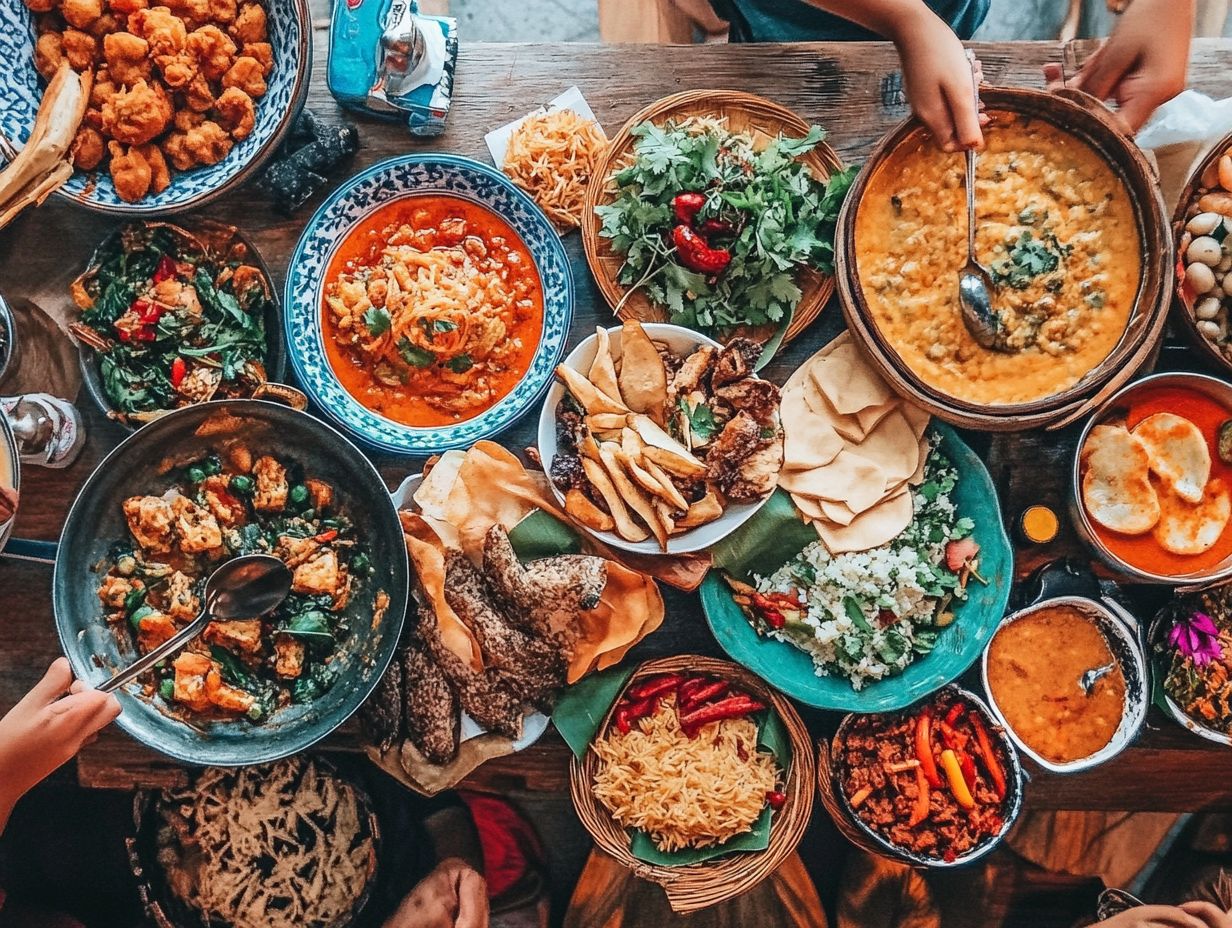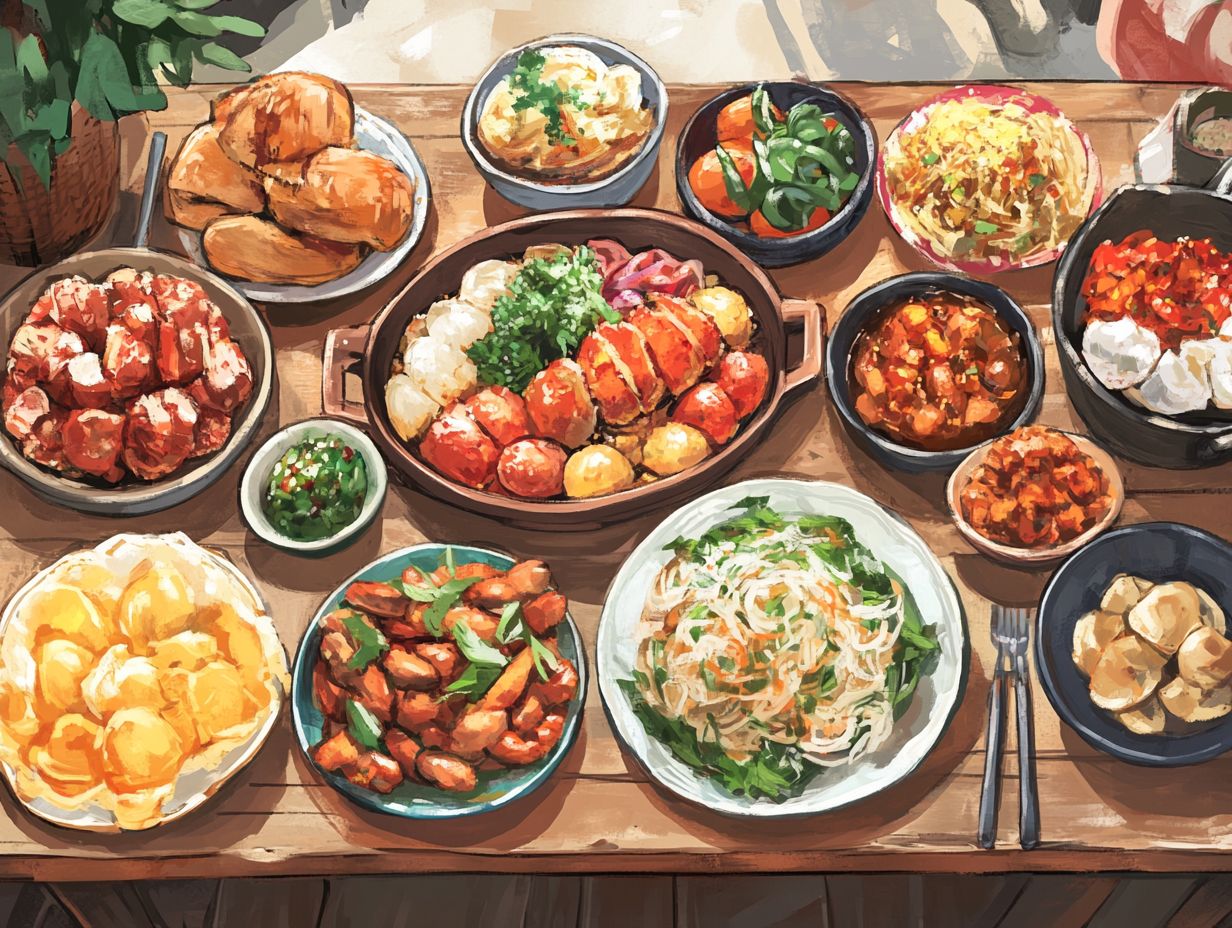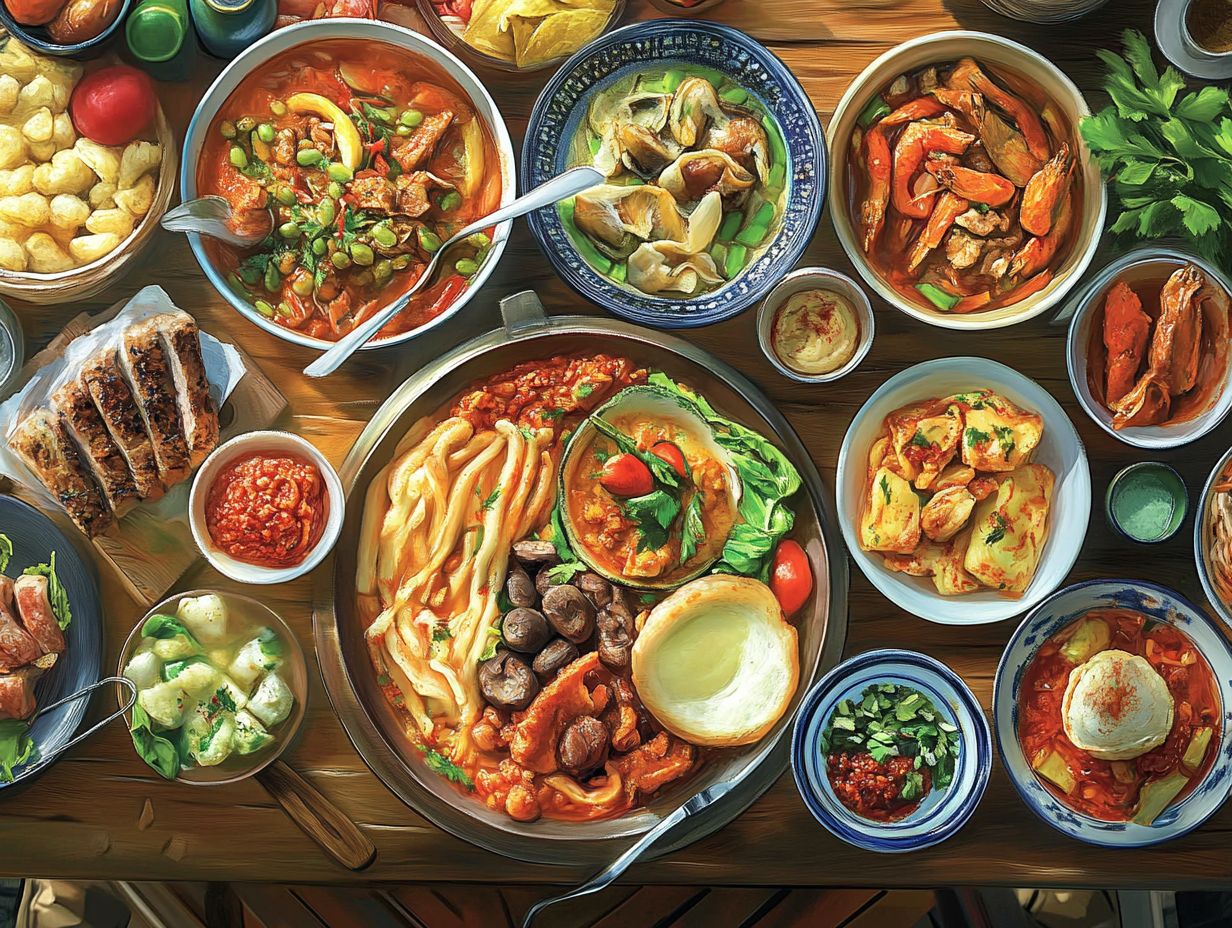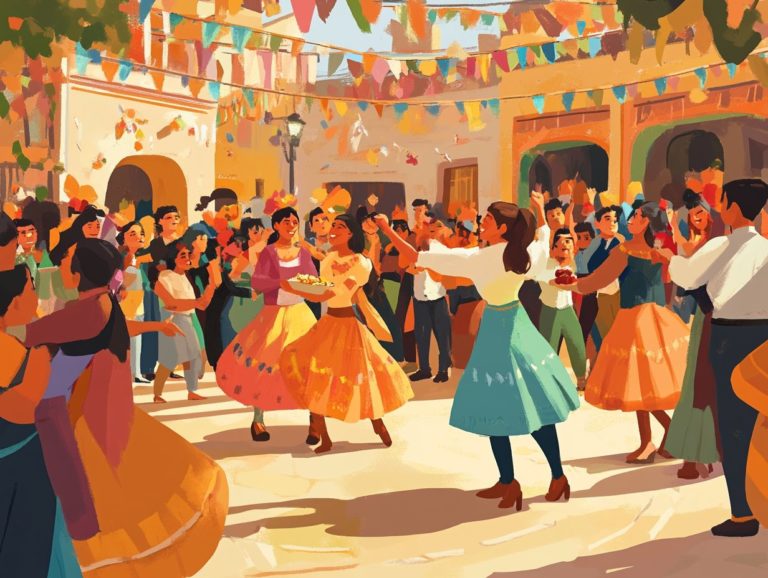Exploring Local Cuisine: A Student’s Guide
Local cuisine is much more than just food. It opens the door to understanding a region’s culture, history, and community.
This guide invites you on a culinary adventure. You’ll discover the benefits of exploring local dishes.
You’ll learn how to seek out authentic eateries, what to watch for when looking at menus, and how to navigate exciting new flavors.
You ll also find tips for enjoying street food on a budget and exploring local markets. Plus, must-try regional specialties are sure to tantalize your taste buds!
Get ready to dive into the vibrant world of local cuisine it s an adventure you won’t want to miss!
Contents
- Key Takeaways:
- Benefits of Exploring Local Cuisine
- How to Find and Try Local Cuisine
- Tips for Ordering and Trying New Foods
- Budget-Friendly Ways to Explore Local Cuisine
- Common Local Ingredients and Dishes
- Frequently Asked Questions
- 1. What is local cuisine and why is it important to explore as a student?
- 2. How can I find the best local restaurants to try while exploring a new city?
- 3. Is it important to be open-minded when trying new local dishes?
- 4. How can I budget for trying different local dishes as a student?
- 5. Are there any dietary restrictions I should be aware of when exploring local cuisine as a student?
- 6. How can I learn more about the history and culture behind local dishes?
Key Takeaways:

- Immerse yourself in the culture and flavors of a new place by exploring its local cuisine.
- Research and choose authentic local restaurants or try budget-friendly options like street food and markets.
- Communicate with servers and open yourself up to trying new dishes and ingredients for a truly unforgettable culinary experience.
What is Local Cuisine?
Local cuisine refers to unique culinary practices, styles, and dishes native to a specific region or culture. It embodies the rich heritage and traditions passed down through generations.
These culinary practices reflect the geographical features, seasonal ingredients, and cooking techniques that define a place’s food landscape.
From the vibrant dishes of Thailand to the renowned cuisines of Japan and Mexico, local cuisine offers a fascinating aspect of food exploration. It invites food lovers to embark on journeys filled with interesting facts and hidden gems.
The significance of local cuisine extends beyond mere sustenance; it is part of a community’s identity. It echoes historical narratives and societal values.
Local practices, such as traditional farming and fishing methods, contribute not only to the distinct flavors of regional dishes but also emphasize sustainable practices rooted in nature.
By using locally-sourced ingredients, you honor the land and its offerings. This showcases the diversity of flavors available in various climates.
The unique cooking methods like fermentation, which turns food into something delicious, and grilling, which means cooking over an open flame create an authentic culinary tapestry that connects you to both the past and each other.
Benefits of Exploring Local Cuisine
Exploring local cuisine presents a wealth of benefits that go far beyond tantalizing your taste buds. It offers you a food journey that deepens your appreciation for food culture: embracing local cuisine abroad.
By engaging directly with local cooking methods and traditions, you immerse yourself in a rich tapestry of flavors and stories that elevate your dining experience to something truly extraordinary.
Cultural Immersion and Culinary Adventure
Cultural immersion through local cuisine offers an enriching experience. It allows you to dive deep into the culinary traditions and dining customs of a region.
This exploration transforms a simple meal into a remarkable culinary adventure, brimming with treasures and authentic dishes.
This journey not only tantalizes your taste buds but also serves as a gateway to understanding the history and values of a community.
Take Peru, for instance; the vibrant flavors of ceviche reveal a coastline abundant with fresh fish. Meanwhile, the ceremonial preparation of dishes like pachamanca showcases the rich agricultural practices and respect for the earth that define Andean culture.
In Germany, indulging in regional specialties such as sauerkraut or bratwurst can lead to delightful discoveries about local brewing traditions and communal gatherings.
By engaging in food exploration, you uncover the very soul of a place. Every bite becomes a story worth savoring.
How to Find and Try Local Cuisine

Exploring local cuisine is a delightful pursuit for any food enthusiast. It invites you to embark on food adventures that unveil regional specialties, unique dishes, and vibrant flavors that define a locale’s food culture, much like understanding local cuisine: study in Italy.
This adventure often leads you to busy food markets and hidden gems. Each bite reveals a story and a connection to the heart of the community.
Researching and Choosing Restaurants
Researching and selecting the right restaurants is essential for a successful culinary adventure. This approach gives you the power to make informed decisions about where to savor authentic dishes that beautifully reflect the region’s diverse flavors and culinary traditions.
You can significantly enhance this process by immersing yourself in food documentaries and travel shows that spotlight local eateries and their unique offerings. These visual narratives not only showcase popular dining spots but also delve into the cultural significance of various cuisines.
By understanding local dining customs such as the etiquette surrounding communal meals or the importance of seasonal ingredients you elevate your overall experience. Gathering insights from these sources allows you to appreciate the intricate connections between food, culture, and community, ultimately crafting a more fulfilling and memorable dining experience.
Tips for Ordering and Trying New Foods
Ordering and sampling new foods can be an exhilarating adventure, particularly when you indulge in unique dishes and signature offerings that highlight a region’s culinary treasures and diverse flavors.
You can broaden your culinary horizons by trying unique dishes and signature offerings that highlight a region’s culinary treasures.
Communicating with Servers and Understanding Menu Items
Effective communication with servers and a solid understanding of menu items are essential skills for anyone who truly wishes to savor local cuisine. This knowledge not only elevates your dining experience but also deepens your appreciation for diverse culinary traditions.
Engaging in conversation with servers can lead to delightful discoveries. Why not ask them about seasonal ingredients or local specialties that fly under the radar? Many eateries take great pride in their unique offerings, and insights from servers can significantly enhance your meal.
Understanding various dining customs can enrich your experience even further. For instance, in Japan, it s customary to express gratitude by saying “Itadakimasu” before meals, while in Spain, sharing tapas fosters a sense of community among diners.
These nuances not only connect you to the food culture but also deepen your overall appreciation of the dining landscape.
Budget-Friendly Ways to Explore Local Cuisine

Eating well doesn’t have to break the bank! Exploring local cuisine on a budget is entirely feasible and can transform into an exhilarating culinary adventure.
Imagine immersing yourself in the vibrant world of street food and lively food markets, where hidden culinary gems await you each offering exquisite flavors at a fraction of the cost of Michelin-starred establishments.
Street Food and Local Markets
Street food and local markets are truly the essence of local cuisine, offering culinary delights that beautifully reflect the region’s food culture. They present a unique opportunity for you to uncover hidden gems that traditional restaurants might miss.
Imagine the sizzling aroma of grilled meats wafting through the bustling night markets of Taipei or the vibrant stalls overflowing with fresh produce and street snacks in lively Mexico City. These eateries immerse you in the experience.
When you indulge in local delicacies like Thailand’s flavorful pad thai or India’s spicy chaat, you forge a deeper connection to the culture around you. These food hubs serve as lively social gathering spots, where you can engage with locals, learn about traditional cooking methods, and discover the intriguing stories behind each dish.
Therefore, the joy of exploring street food and local markets goes beyond satisfying your taste buds; it enriches your entire travel experience.
Common Local Ingredients and Dishes
Grasping the nuances of local ingredients and traditional dishes is vital for anyone eager to truly immerse themselves in a region’s food culture. These elements are not merely components of a meal; they are key players in shaping the food culture and providing a genuine taste of the area’s rich heritage.
Regional Specialties and Must-Try Foods
Regional specialties and must-try foods are essential to local cuisine. They offer you the chance to savor unique dishes that embody the culinary treasures specific to a particular area. This experience enriches both your food experiences and culinary knowledge.
These specialties serve not only as delightful meals but also as reflections of the history and culture from which they originate. For instance, when you enjoy a bowl of steaming Pho, a traditional Vietnamese noodle soup, from Vietnam, you re not just having a meal; you re tasting the country’s rich culinary traditions, complete with fresh herbs and spices like basil and cilantro.
Similarly, Italian risotto showcases the agricultural bounty of Northern Italy with its creamy texture and diverse flavors. Think saffron from Abruzzo or wild mushrooms. By exploring these regional delicacies, you indulge your palate while gaining insights into the cultural significance and stories behind each dish.
Frequently Asked Questions

1. What is local cuisine and why is it important to explore as a student?
Local cuisine refers to the traditional or unique dishes that are characteristic of a particular region or culture. As a student, exploring local cuisine opens doors to new cultures and delicious experiences!
2. How can I find the best local restaurants to try while exploring a new city?
One of the best ways to find local restaurants is to ask for recommendations from locals or other students who have lived in the area. You can also do some research online and read reviews from other travelers. Additionally, understanding local humor can enhance your experience as you explore local markets or take food tours to discover hidden gems.
3. Is it important to be open-minded when trying new local dishes?
Yes, it is important to be open-minded when trying new local dishes. While some may seem strange or unfamiliar, it s a great opportunity to try something new and expand your culinary horizons. Don t miss out on discovering a new favorite dish!
4. How can I budget for trying different local dishes as a student?
Plan ahead and allocate a certain amount of money each week for food. You can save money by opting for street food or local markets instead of expensive restaurants. Another option is to cook some meals at your accommodation and then splurge on a few special meals.
5. Are there any dietary restrictions I should be aware of when exploring local cuisine as a student?
Yes, it s always important to be aware of dietary restrictions when trying new dishes. Inform the restaurant or street vendor of any allergies or food preferences you may have. It s also a good idea to do some research beforehand on common ingredients in the local cuisine.
6. How can I learn more about the history and culture behind local dishes?
Talk to locals and ask about the origins and significance of certain dishes. You can also do some research online or visit local museums or cultural centers that focus on food and cuisine. Food tours or cooking classes can also provide insight into the cultural significance of local cuisine.






